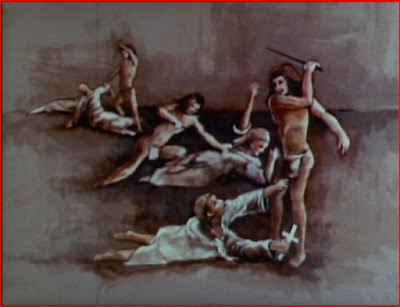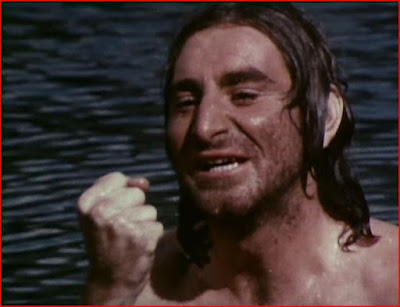Stoddard: Well, Kathryn, I understand what you mean, and I agree with you, but when you hired me to lead this expedition and to hire these other men, I hired the men I could find. You know, you don't find the men to do this kind of work in the ivy covered universities back East. You find them in the border towns and the backwash of life. I didn't have a lot of time to look and these are the best I could find.
Probably without meaning it, screenwriters Robert Mason and Phillip Michel comment eloquently on their own profession during a quiet moment of Treasure of Tayopa, the only writing credit in either man's career. It's also the only directorial credit for Bob Cawley, whose only other credit of any kind is for producing an Anita Bryant TV special in 1980. For the majority of the actors, also, this was their only chance, and one gets the sense of a group of people finding each other in the backwash of life and banding together in search of cinematic fortune. Treasure shows signs of ambition all over the place as a wannabe epic dominated by a gigantic performance billed like a future star's introduction that was his first and only bow.
Narrator: Since the 17th century, a legend, part fact, part fiction, has become shrouded in the mists of time, and although Tayopa is of the past, it is the dream of men and women searching today, and making plans to search tomorrow.
So says the one celebrity in the cast, "Host/Star" Gilbert Roland, the Cisco Kid of the 1940s, flaunting some sort of beverage as he introduces the story. He recounts the historical legend of Tayopa, a mine of gold and silver operated by Jesuit priests, the location of which was lost when Indians slaughtered the padres.
Before the opening credits we were introduced to the characters in our story: the treasure hunters Tom Stoddard, Felipe and a man named Sally who complains, "I'm hot, I'm cold, I'm cold and I'm hot" while waiting for their leader to land a plane. He and Felipe are stunned to learn that their leader is no El Jefe but a La Jefa -- Kathryn Delgadillo (Rena Winters), the daughter of a dead treasure hunter whose map to Tayopa she has memorized.
We see her mourning in flashback as one of the movie's original songs plays over:
I took a ride on a train of thought through the valleys of my mind.
Down along the forgotten track to a day when time was kind.
Oh I sat by the window with memories in my head,
Taking a trip on the train of thought back through the years I sped.
Now the train of thought is the only one that runs through yesterday.
The only way to turn back time; there is no other way.
Rushing by my memory the past went rolling by.
I wondered where the time had gone when life was mine to try.
But a man doesn't think of time and tomorrow's far away
When the sun of life is going down we turn to yesterday,
Well, it's good to see gold mines again [inaudible] with the past,
But don't try to stay too long, the welcome will not last.
The songs are meant to give the film that extra epic quality, I suppose. Director Cawley also strives to give the story some sweep with some good use of landscape and occasionally impressive successive dissolves to convey the movement of the expedition. On the other hand, he's also a little too fond of pointing his camera directly at the sun. Two factors work against Cawley, however: his writers and his actors. Both groups try their best, but lack something. Bob Corrigan, who plays Tom Stoddard, sounds like a radio announcer or the sort of voice you might hear calling professional wrestling matches. He often seems to be improvising his lines, but while his delivery is natural, the voice comes out processed. Rena Winters tries to convey authority and forcefulness but really seems a little too old for this stuff. There's even less to be said for the rest, especially the gang of idiots playing a trio of stereotypical Mexicans -- the kind who actually say things like "Ay, Caramba!" and talk Spanish to the Americans but English to each other. The one glowing, indeed radioactive exception to this often drab crew is the man who gets an "Introducing" credit, the one and only Phil Trapani as the man named Sally.
Sally is the real catalyst of the film, lusting after yet competing for leadership with La Jefa. Their conflict is established early when he urges her to "tell Mr. Manners [Tom] that it's time to get my protection." Does he want a condom? Of course not; he wants a gun, even though he already has a crossbow. "It's silent, it's accurate, it's deadly and it's my friend," he explains.
Sally's the one most irritated when the Mexicans give them a hard time on the trail. While the others tell him to forget the teasing, Sally can't let go of two overpowering facts: "They pulled my hair and pushed my horse," he says, "No one does that, Stoddard!" At his first opportunity Sally goes back and slaughters the three Mexicans, ripping into one repeatedly with a machete while crying out, "Bleed, damn you!" But there's a fourth Mexican, Andreas, who had encountered our heroes earlier, who discovers Sally's incriminating hat at the murder scene. "Gringo bastardo!" he cries, and the stage is set for a terrible vengeance. As it turns out, his vengeance consists largely of horse stealing and voyeurism.
It's Sally whom Stoddard's talking about in the quote I opened with. "Now Sally," he continues, "Sally's got problems." To which Kathryn responds, "I think Sally's sick." Tom agrees, but insists that Sally's an excellent metal detector man. "If there's anything out there to be found with a metal detector, Sally will find it," he promises. Kathryn isn't reassured. "It's just a feeling I have in my heart," she insists, "I feel that the seeds of tragedy are sown among this group, and that in time it will touch us all, even you."
It's definitely Sally's ambition to touch La Jefa. While Andreas watches her skinny-dip from afar, Sally moves right in, urging her to leave Tom and Felipe and team up with him. "You're strong, Kathryn," he says, "strong like the gold and silver of Tayopa!" Tom shows up to drive him off at gunpoint before he can come on too strong, but this was just to prime us for the explosion to come.
But let's have another song, first:
Another morning sunrise.
Darkness leaves the sky.
Another morning sunrise.
Another day to try.
Well, the sun is coming up.
Fate has let us have one more tomorrow.
With the new dawn of the day,
Will it bring with it our fortune or our sorrow?
Our lust for gold, it has no rest.
We survive to pass the test.
Of magic yellow gold I speak:
A treasure cursed by death we seek
With another morning sunrise....
Sally's the lucky one to actually find the Treasure of Tayopa, and he uses his good fortune to get Kathryn's guard down. She tries to rebuff his advances, insisting that "I'm the leader of this expedition," but Sally answers:
No, no, you're not leader. You're a woman, a woman that needs to be tamed. After I tame you, after I tame you, I'm going to take you, and then -- heheheh -- then we're going to share Tayopa!
Sally shows his good faith by flinging Kathryn into the water, stripping the back off her blouse (singing, "I wish I was in the land of cotton, old times there are NOT FORGOTTEN!!!"), flogging her with his belt and pressing her face into the mud. He takes her lucky Tayopa talisman, meant to guard her from "the curse of the snake," and proceeds to slaughter Tom and Felipe.
Convinced that he's killed Kathryn too, Sally rises to heights of Lugosian rapture as thunder rumbles overhead: "Now they're all gone. I'm the richest man in allll the world! Not even God can take Tayopa!"
But he hasn't reckoned upon La Jefa's resilience and implacable wrath. As Sally gathers coins while kissing and sucking on the talisman, Kathryn closes in with primitive vengeance on her mind.
There's more to the story after this, but unless the notion of Rena Winters wandering deliriously through the wilderness (and why wander away from Tayopa, for Christ's sake?) and eating raw rattlesnake meat attracts you, the main attraction is already over. Phil Trapani's is, as far as I know, literally a once-in-a-lifetime performance of naive genius. Whether he operated on instinct or was guided by director and writers, he seems to have understood that in low-budget exploitation cinema, it's up to the actors to become special effects. The difference between movies that are really bad and movies that are so bad that they're good is that the ones that are just bad are boring. Trapani doesn't allow Treasure of Tayopa to be boring. He fully earns that special billing, and it's actually too bad he didn't work again. I think there would have been a future for him playing psychos just when there was a major demand for the type.
But I shouldn't treat the movie as if it were a one-man show. This is one of those bad movies that has a poignant quality because you can tell that nearly everyone was really trying hard, and sometimes the incompetent doing their utmost accomplish more, or at least do things more memorably, than more skilled or gifted people who are content to coast contemptuously through their work. Any connoisseur of "bad" cinema is sure to enjoy Treasure of Tayopa for Trapani's work alone. But I'm going to let Gilbert Roland have the last, Criswellian word.
Somewhere in old Mexico, high in the trackless Sierra Madres, the greatest treasure of all awaits discovery. Who knows, senor, maybe ... maybe you will find Tayopa, or maybe it will be me. Who knows?















>>he seems to have understood that in low-budget exploitation cinema, it's up to the actors to become special effects
ReplyDeleteOMG--what a brilliant summation, Samuel! True, true, yes, yes YES! Yet *another* cutting observation I will now be unable to stop myself stealing from you. ;)
Excellent write-up of a movie I've passed over *many* times on my Mill Creek set, and now must give a shot. Hell, I even used to get up an hour early on Saturday mornings to watch the Cisco Kid/Lone Ranger hour before the cartoons started!
That and the performance you tout, together with the "you can tell everybody's trying their best despite their limitations" vibe--which I *love* in a bad movie--yes, I must give this one a watching.
Like Browning famously wrote, "A man's reach should exceed his grasp, or what's a heaven for?" I like to think that when they pass on, these earnest, ambitious, but sadly incapable filmmakers will be sitting at the right hand of Hitchcock, Kubrick, Tourneur and Bergman, accepted as colleagues in the quest for Perfect Expression.
Excellent stuff!
Thanks, Vicar -- and all those worthies should be attended by nuns of the sort you and the Duke have been discussing this week -- with special attention paid to Walerian Borowczyk, of course.
ReplyDeleteThis comment has been removed by a blog administrator.
ReplyDeleteTreasure of Tayopa is not to be missed. It has become a huge classic cult film, right up there with my top 10...charming and corny, the dialog and the cast of characters, Rena Winters, along with Bob Corrigan and Phil Tarpani, is simply the best, I'm so glad that I have found this great film.
ReplyDelete